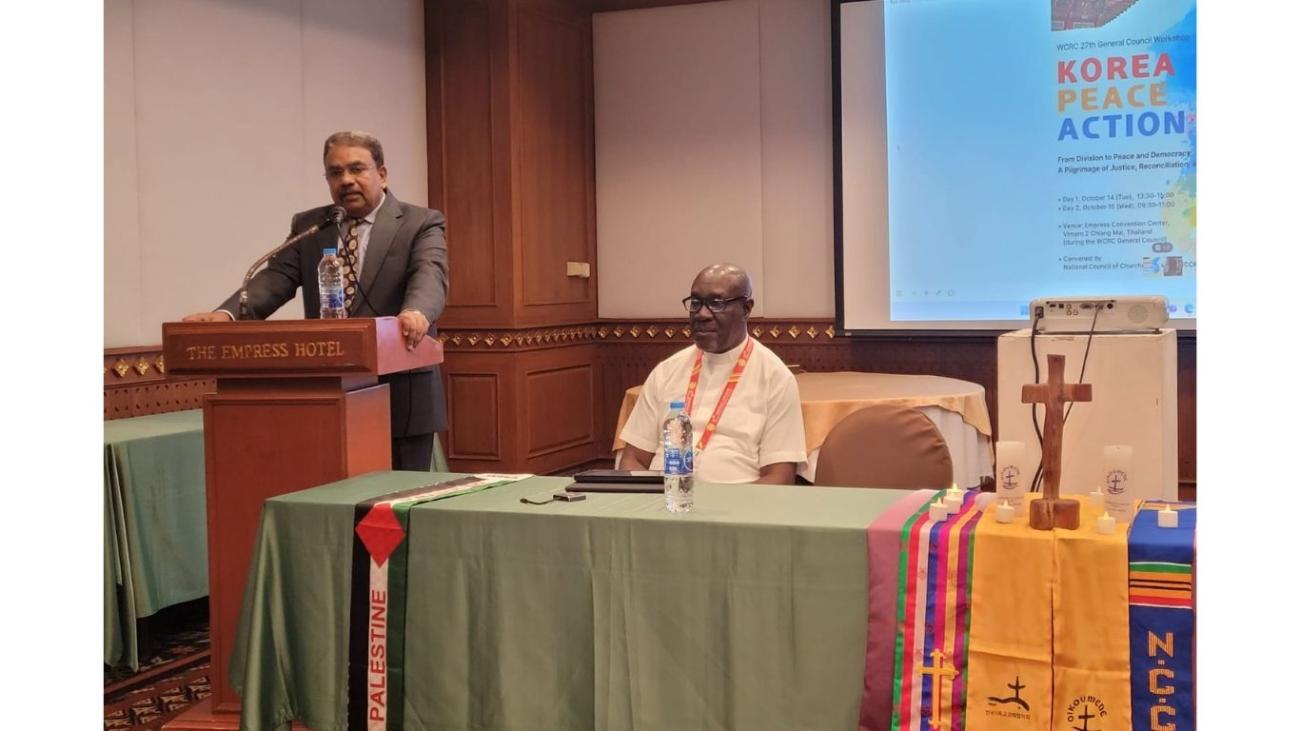CCA General Secretary urges greater Asian participation and solidarity in Korean Peninsula peace advocacy at WCRC General Council

CCA General Secretary Dr Mathews George Chunakara speaking at the Korea Peace Action workshop
Chiang Mai, Thailand: During a workshop facilitated by the National Council of Churches in Korea (NCCK) at the 27th General Council of the World Communion of Reformed Churches (WCRC), Dr Mathews George Chunakara, General Secretary of the Christian Conference of Asia, stated that the Korean Peninsula is a significant geopolitical concern in Asia. He noted that its importance stems from a complex history, strategic location, and unresolved conflicts that involve multiple external actors and affect many Asian countries.
In this context, Dr Chunakara emphasised that peace advocacy should extend beyond the immediate subregional countries of Northeast Asia, encouraging broader Asian solidarity and engagement by churches and the ecumenical movement.
The CCA General Secretary highlighted the steadfast and enduring efforts of Korean churches, alongside the global ecumenical movement, in promoting peace and reconciliation on the Korean Peninsula, particularly since the Tozanso consultation organised by the World Council of Churches in 1984.
Having been actively involved in ecumenical Korea peace advocacy for over three decades through his roles in both the CCA and the WCC, Dr Chunakara encouraged Korean churches to make every effort to engage all Asian churches in this advocacy. He urged them to invite the wider Asian Christian community to stand in solidarity and actively participate in promoting peace on the Korean Peninsula.
Reiterating his remarks during the NCCK’s centenary celebrations in September 2024, Dr Chunakara expressed his deep appreciation for the NCCK’s prophetic witness and missional engagement over the past century.
“Despite numerous challenges, the NCCK has consistently championed the cause of inter-Korean peace and reunification, remaining a symbol of hope and resilience,” Dr Chunakara added.
The workshop, one of several caucus sessions, provided a space for reflection and action, as participants explored how faith can serve as a catalyst for reconciliation in the face of historical wounds and political divisions.
Rev. Prof. Dr. Jerry Pillay, General Secretary of the World Council of Churches (WCC) said, “There are moments when the possibilities for peace appear, and then they fade. But persistence brings hope — and hope brings the bright day. Prayer brings hope, and we must never give up. God calls us to peace, to unity, to reconciliation. Keep up the fire; keep igniting our spirits. Something new will come because God is present.”
Rev. Dr Setri Nyomi, WCRC General Secretary, recalled that when he first joined the Communion in 2000, the topic of Korean reunification was already on the table. “As the NCCK celebrated its centenary last year, it was heartening to see that this commitment remains at the forefront of its mission. Nothing demonstrates the call to persevere better than this ongoing pursuit of peace.”
Rev. Dr. Japhet Ndhlovu, Executive Minister of the Church and Mission Unit of the United Church of Canada, moderated the session.
For photos from the NCCK workshop at the WCRC 27th General Council, please click here.










